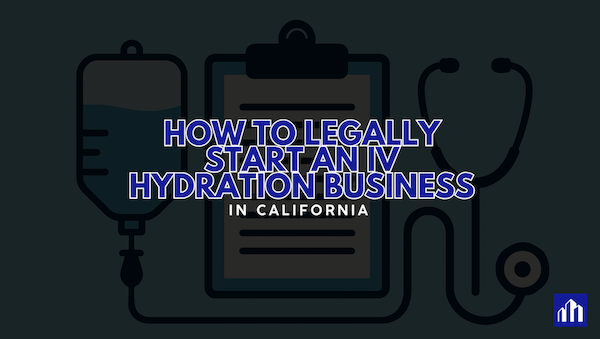Starting your own IV hydration business in California sounds exciting—but without the right legal foundation, it can quickly become a regulatory nightmare. The Golden State is known for its strict healthcare compliance rules, and that includes IV therapy clinics, mobile hydration startups, and MedSpas.
Here, we’ll break down what you must know to legally launch your IV hydration business while protecting your license and your future profits.
1. Choose the Right Business Entity
Many healthcare providers start as sole proprietors or form an LLC without realizing these structures may not be compliant in California. Why?
Because if you’re offering medical services (which IV therapy often qualifies as), your business must be structured under a Professional Corporation (PC) and operate in line with the Corporate Practice of Medicine (CPOM) doctrine.
✅ Tip: A general LLC cannot legally hire physicians or nurse practitioners to perform medical treatments in CA.
2. Identify Your Medical Director (If Required)
Non-physician providers—such as RNs, NPs, and PAs—cannot independently own or operate a medical practice offering IV therapy. You’ll need a medical director (a licensed physician) to supervise the medical aspects of the business.
The physician must be actively involved, not just “renting out” their license.
3. Understand Compounding and Pharmacy Law
If you’re mixing vitamins, nutrients, or medications—even two items in the same syringe—that’s compounding. This triggers pharmacy regulations.
You’ll likely need:
- A partnership with a licensed 503B compounding pharmacy
- Clearly documented medical protocols
- A prescriber/patient relationship and signed orders for each treatment
🚫 No flow hood or compounding license? Then don’t mix your own formulas.
4. Draft and Implement Medical Protocols
Protocols help ensure you’re practicing safely and within your scope. They also show regulators that your operation is legitimate and medically guided.
These should include:
- Patient screening procedures
- Emergency protocols
- Physician oversight expectations
- Treatment documentation and follow-up care
5. Secure Business Licenses and Insurance
You’ll need:
- A business license from your city/county
- General liability insurance
- Malpractice coverage for all clinical providers
6. Marketing Legally
You must avoid misleading or non-compliant claims in your advertising—especially around treatment results.
All advertising should be:
- Clear and medically accurate
- Approved by your medical director
- Compliant with California’s Medical Board regulations
Final Thoughts:
Yes, you can launch a successful IV hydration clinic in California—but not without getting legally legit first. It’s not just about staying out of trouble—it’s about building a business that’s actually sustainable.
📞 Ready to Launch the Legal Way?
Book a free strategy call to make sure you’re setting up your IV hydration business correctly—from entity formation to pharmacy compliance.
👉 Book Now

